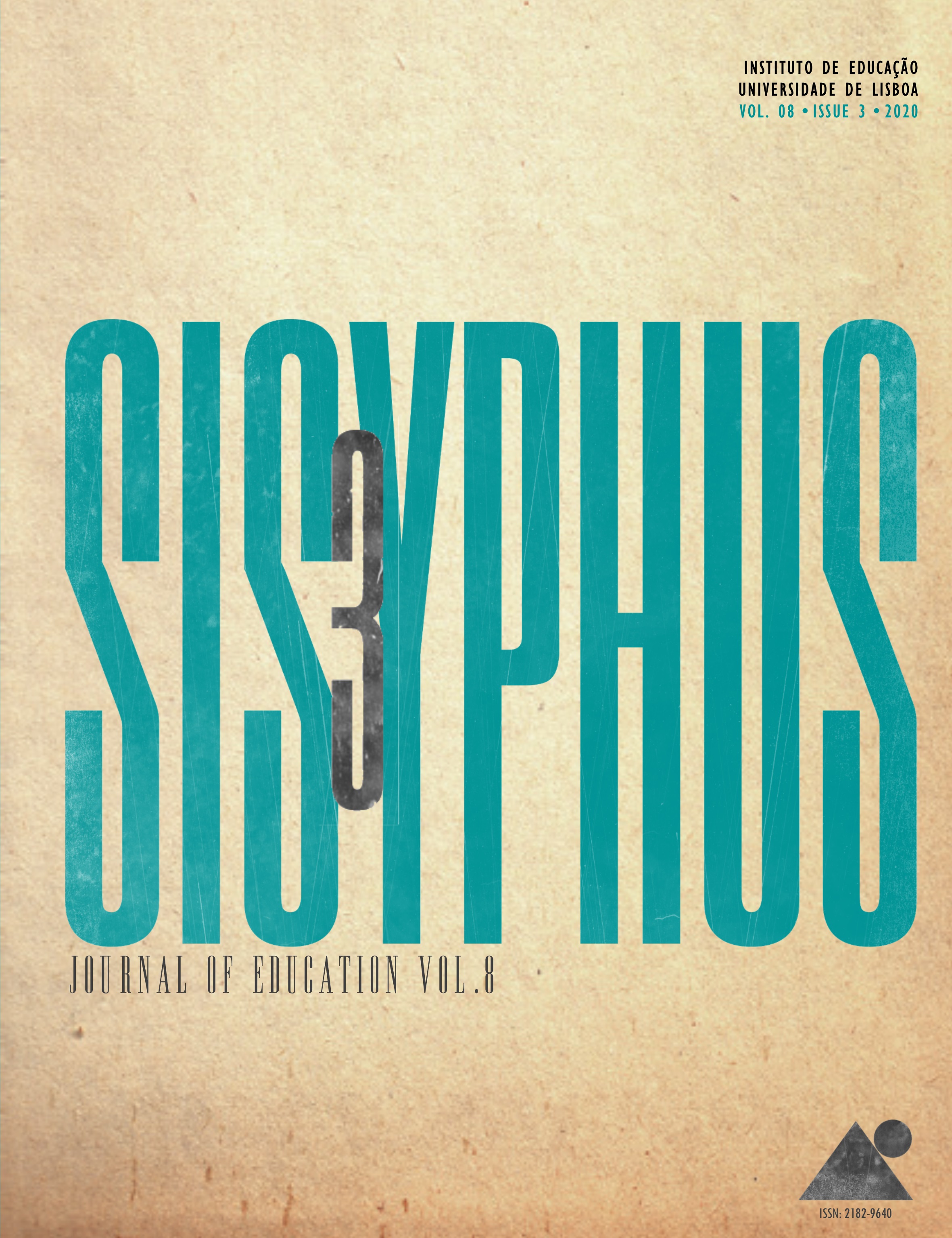Education’s Experience in an Age of Anti-Politics
Reading John Dewey in the Third Decade of the 21st Century
DOI:
https://doi.org/10.25749/sis.19986Keywords:
disposition, instrumentalism, anti-politics, democracy, education, race, the artsAbstract
Dewey’s argument for education is predicated on how, as free and intelligent beings, we have the power to develop dispositions. However, in a context where democracy is neutered by anti-politics, reading Dewey now comes with an urgent need to revisit his argument for an experiential and experimental approach towards the world. Revisiting Horkheimer’s critique of Dewey, which reveals two opposed notions of instrumentalism, this article argues that unless Dewey is reassessed from the non-identitarian character of his pragmatism, his philosophy of education risks being lost to an alignment with social constructivism. This exposes the Deweyan approach to what Maxine Greene calls a disjunction in the culture between everydayness and reason, where the “integrations” that Dewey achieved with his concentration on experience vanish. Historically framed, this paper draws on Lorraine Hansberry and James Baldwin’s discussion of a democracy that is more akin to a “burning house” than an associated form of living.
Downloads
References
BALDACCHINO, J. (2009). Education Beyond Education. Self and the imaginary in Maxine Greene’s philosophy. New York: Peter Lang.
BALDACCHINO, J. (2014). John Dewey. Liberty and the Pedagogy of Disposition. Dordrecht, New York: Springer.
BALDWIN, J., CAPOUYA, E., HANSBERRY, L., HENTOFF, N., HUGHES, L., & KAZIN, A. (1961). The Negro in American culture. Cross Currents, 11(3), 205-224.
BERLIN, I. (1998). Two Concepts of Liberty. In H. HARDY & R. HAUSHEER (Eds.), The Proper Study of Mankind. An Anthology of Essays (pp. 191-242). London: Pimlico.
BERNSTEIN, R. J. (1966). John Dewey. Atascadero: Ridgeview.
BOBBIO, N. (1995a). Il Futuro della Democrazia. Torino: Einaudi.
BOBBIO, N. (1995b). Stato Governo e Società. Torino: Einaudi.
BUNZEL, J. H. (1967). Anti-politics in America; reflections on the anti-political temper and its distortions of the democratic process. New York: Knopf.
CAMUS, A. (1991). The Myth of Sisyphus and Other Essays. New York: Vintage.
COLLINGWOOD, R. G. (1999). The New Leviathan: Or Man, Society, Civilization and Barbarism. Oxford: Oxford University Press.
CROCE, B. (1907). Ciò che è vivo e ciò che è morto della filosofia di Hegel. Laterza
DEWEY, J. (1893). The superstition of necessity. The Monist, 3(3) (April), 362-379.
DEWEY, J. (1896). The reflex arc concept in psychology. The Psychological Review, 3(4) (July), 357-370.
DEWEY, J. (1953). Essays in experimental logic. New York: Dover Publications.
DEWEY, J. (1958). Experience and Nature. New York: Dover Publications.
DEWEY, J. (1966). Democracy and Education. New York: The Free Press.
DEWEY, J. (1984). Individualism Old and New. Amherst NY: Prometheus Books.
DEWEY, J. (1989). Freedom and Culture. Amherst NY: Prometheus Books.
DEWEY, J. (1997). Experience and Education. New York: Touchstone.
DEWEY, J. (2000). Liberalism and Social Action. Amherst NY: Prometheus Books.
GIROUX, H. A., & BHATTACHARYA, D. (2017). Anti-politics and the scourge of authoritarianism. Social Identities, 23(5), 503-517. DOI: https://doi-org.ezproxy.library.wisc.edu/10.1080/13504630.2016.1219145
GREENE, M. (1973). Teacher as Stranger. Educational philosophy for the modern age. Belmont CA: Wadsworth Publishing.
GREENE, M. (1988). The Dialectic of Freedom. New York: Teachers College Press.
HICKMAN, L. A., NEUBERT, S., & REICH, K. (Eds.) (2009). John Dewey between pragmatism and constructivism. New York: Fordham University Press.
HOBBES, T. (1982 [1651]). Leviathan. London: Penguin.
HORKHEIMER, M. (1974). Eclipse of Reason. New York: Continuum.
HORKHEIMER, M. (2012). Critique of instrumental reason. New York: Verso.
JACOBS, B., & LAUGHLAND, O. (2017, August 16). Charlottesville: Trump reverts to blaming both sides including ‘violent alt-left’. The Guardian. Retrieved 25 April 2020, from: https://www.theguardian.com/us-news/2017/aug/15/donald-trump-press-conference-far-right-defends-charlottesville
RETTER, H. (2012). Dewey’s progressive education, experience and instrumental pragmatism with particular reference to the concept of Bildung. In P. SILJANDER, A. KIVELÄ & A. SUTINEN (Eds.), Theories of Bildung and growth. Connections and controversies between continental educational thinking and American pragmatism (pp. 281-302). Rotterdam: Sense Publishers.
RORTY, R. (1980). Philosophy and the Mirror of Nature. London: Blackwell.
RORTY, R. (1982). Consequences of Pragmatism. University of Minnesota Press.
RORTY, R. (1990). Contingency Irony and Solidarity. Cambridge University Press.
RUITENBERG, C. (2011). The trouble with dispositions: a critical examination of personal beliefs, professional commitments and actual conduct in teacher education. Ethics & Education, 6(1), 41-52. DOI: https://doi-org.ezproxy.library.wisc.edu/10.1080/17449642.2011.587347
SINDERBRAND, R. (2017, January 22). How Kellyanne Conway ushered in the era of ‘alternative facts’. The Washington Post. Retrieved from: https://www.washingtonpost.com/news/the-fix/wp/2017/01/22/how-kellyanne-conway-ushered-in-the-era-of-alternative-facts/
SKINNER, Q. (1998). Liberty Before Liberalism. Cambridge University Press.
SKINNER, Q. (2002). A Third Concept of Liberty. In London Review of Books. 24(7)4, 16-18.
VICO, G. (2000 [1744]). New Science. London: Penguin.
Downloads
Published
Issue
Section
License
Copyright (c) belongs to Sisyphus - Journal of Education. However, we encourage issued articles to be published elsewhere, provided that Sisyphus authorization is asked for and that authors integrate our original source citation and a link to our website.
Author Self-Archiving Policy
Author(s) are permitted to self-archive the final published version in institutional or thematic repositories, and in their personal or institutional websites.
DORA Signer
The Instituto de Educação da Universidade de Lisboa, Sisyphus' Publisher, is a San Francisco Declaration on Research Assessment signer.






